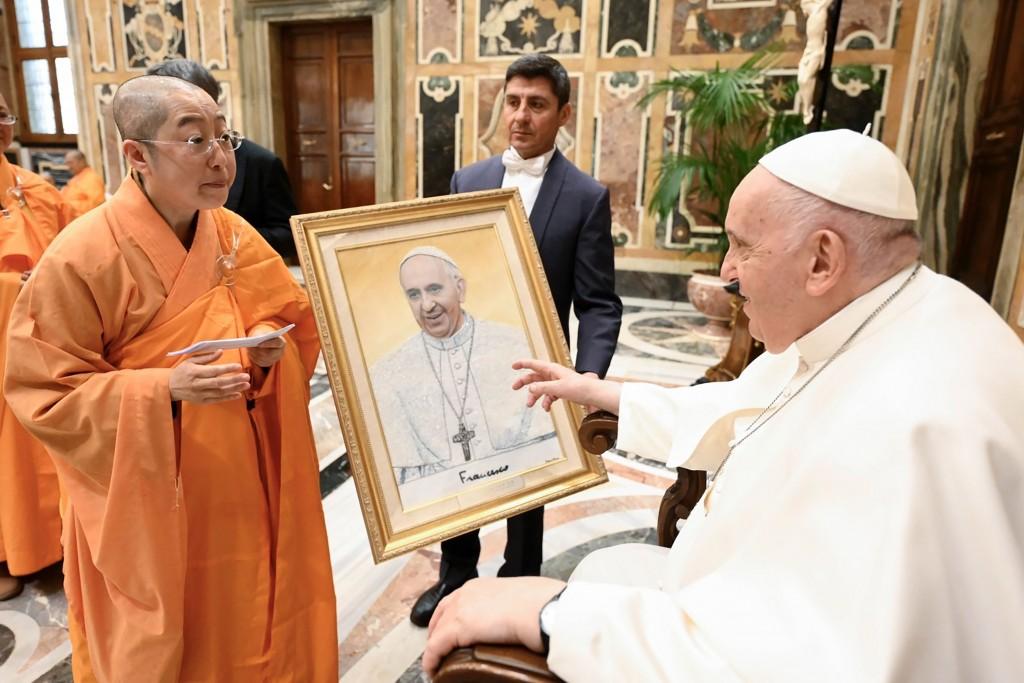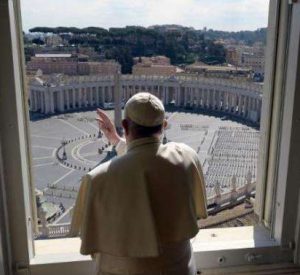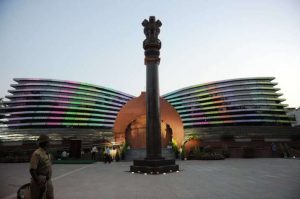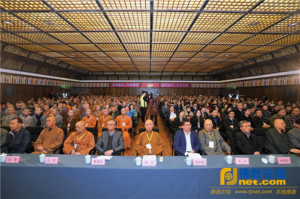
A delegation of more than 100 monastics from Taiwan’s United Association of Humanistic Buddhism recently met with Pope Francis at the Vatican. The conversation during interfaith gathering, which the Holy See described as a opportunity to “promote inter-religious exchange and communication in the post-pandemic era,” served to highlight the role of religions and spiritual traditions in fostering fraternity through a culture of encounter.
“Your visit, which you have called an educational pilgrimage, represents a privileged opportunity to promote the culture of encounter, where we take the risk of opening ourselves to others, hoping to discover friends, brothers, and sisters, and thus learning more about ourselves,” the pope said to the assembled monastics. (YouTube)
The head of the Taiwanese delegation, Venerable Hsin Bau, the abbot of the Fo Guang Shan monastic order, presented two gifts on behalf of the guests: a mosaic painting of the Pope by a young disabled Taiwanese girl, and a second portrait by the children of Fo Guang Shan Daci Children’s Home, which he said represented the Pope’s love for the world and blessings from Taiwan.
Ven. Hsin Bau also expressed hope that continued religious exchanges between Taiwan and the Vatican would promote tolerance and harmony between the spiritual traditions of the world.
In his address to the assemble delegates on 16 March, the Pope observed that today’s world was one characterized by rapid changes, which have been affecting humanity and the planet, and that the pace of life and work had intensified.
“This reality also affects religious life and culture and calls for a fitting formation and education of the young in timeless truths and in tested methods of prayer and peace-building,” he said. “Throughout history, religious believers have created sacred times and spaces as oases of encounter, where men and women can draw the inspiration needed to live wisely and well. Such oases of encounter are even more necessary in our time.” (The Catholic Sun)
The pontiff invited the delegation to hold a three-minute prayer of silence for world peace and for the perseverance to resolve international conflicts and illuminate the darkness in the world.
The Catholic leader also expressed condolences for the passing on 5 February of the influential Buddhist monk and teacher Venerable Hsing Yun, the founding patriarch of Fo Guang and the Buddha’s Light International Association, and a leading figure in the Humanistic Buddhism movement.*
“[Ven. Hsing Yun] was also a master of inter-religious hospitality,” the pope noted of the revered Buddhist master who had led religious exchanges between Taiwan and the Vatican, meeting St. John Paul II in 1997 and Pope Benedict XVI in 2006. (The Catholic Sun)
“Dear friends, it is my hope that this educational pilgrimage will lead you, guided by the thoughts of your spiritual teacher [the] Buddha, to a deeper encounter with yourselves and with others, with the Christian tradition, and with the beauty of the Earth, our common home,” the Pope concluded. “May your visit to Rome be filled with moments of authentic encounter that can become in turn precious opportunities for growth in knowledge, wisdom, dialogue, and understanding.” (The Holy See)
Coinciding with the visit to the Vatican of the Buddhist delegation, Taiwan’s president, Tsai Ing-wen, last week sent an official greeting to the pope, wishing him “good health, resilience and success as you continue to promote human dignity, fundamental rights, democracy, and freedom across the world.” (Taipei Times)
Tsai added: “Together on the path of fraternity, justice, and peace, Taiwan and the Holy See have been working to address significant challenges to help those most in need.” (Taipei Times)
During their time in Rome, the Taiwanese delegation also discussed Fo Guang Shan’s “T-Earth” reforestation initiative, aimed at restoring healthy and bio-diverse ecosystems, and “Vege Plan A,” a global initiative to promote sustainable vegetarian lifestyles.

Humanistic Buddhism is a socially engaged Buddhist movement that emphasizes integrating Buddhist practices and the teachings of Shakyamuni Buddha into everyday life, with a focus on benefiting the living. This movement has been exemplified in Taiwan by four Dharma teachers and leaders popularly known as the “Four Heavenly Kings” of Buddhism: Master Cheng Yen, founder of the Buddhist Tzu Chi Foundation; Master Sheng Yen, founder of Dharma Drum Mountain; Master Hsing Yun, founding patriarch of Fo Guang Shan; and Master Wei Chueh, founder of Chung Tai Shan. These four global Buddhist orders, correspondingly known as the “Four Great Mountains,” have grown to become among the most influential Chinese Buddhist organizations in the world.
* Fo Guang Shan Founder and Leading Light of Humanistic Buddhism Ven. Hsing Yun Dies Aged 97 (BDG)
See more
Pope to Buddhists: Religions play crucial role in fostering fraternity (Vatican News)
Address of His Holiness Pope Francis to a Delegation of the United Association Of Humanistic Buddhism (Taiwan) (The Holy See)
Pope meets local Buddhist group (Taipei Times)
Taiwan Buddhist Association meets Pope Francis (Taiwan News)
Places that inspire people to live wisely, well are needed today, pope says (The Catholic Sun)
Religious Leaders Pray For The World In The Vatican (MENAFN)
#PopeFrancis welcomes members of Humanistic #Buddhism (YouTube)
Related news reports from BDG
Engaged Buddhism: Buddhist Tzu Chi Foundation Brings Compassion and Relief to 36,000 Families in Türkiye
Tens of Thousands Gather in Taiwan for the Funeral of Fo Guang Shan Founder Ven. Hsing Yun
Engaged Buddhism: Buddhist Tzu Chi Foundation Announces US$1-Million Matching Fund for Türkiye Earthquake Relief Effort
Engaged Buddhism: Buddhist Tzu Chi Foundation Mobilizes Relief Effort for Earthquake Survivors in Türkiye
Woodenfish Humanistic Buddhist Monastic Life Program Returns After Three-Year Break












